必修四unit4 Reading
高中英语必修四4_Unit4_Body_language_Reading新人教版

A conclusion of the passage.
Careful reading
( Read para1-2 Find out the answers to the questions)
1 Who will be present at the meeting?
people from different countries
a Japanese The second mistake
George Cook from (Canada)
He ________ bowed to Mr. Cook and his nose touched Mr. _________ moving Cook’s _______ ________. hand He ________ reached his hand ________ _______ ________ to the out Japanese.
Para.1-2 (example)
people present local businessmen
people representing the Chinese government
2 Why are people visiting China?
purpose mistakes
interest
People from different countries misunderstand each other.
He approaches Ms Smith Mr. Garcia by touching _______ ______ her from The _________ _______ shoulder and kissing (Columbia ) first her on the ________. cheek mistake She ______ stepped ________ back Julia Smith appearing surprised _________ from and take a few steps (Britain) away from _______ ______ Mr. Garcia.
2020新译林版高中英语选择性必修四Unit4 Reading重点知识点讲解课件
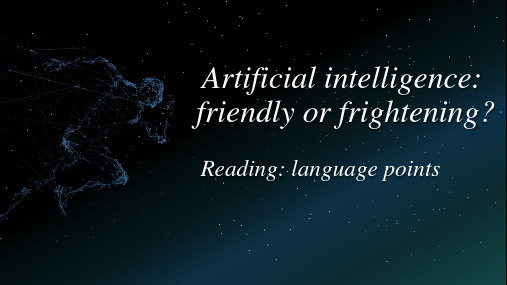
从基础层面上讲 旨在,目的是 能够做… 适应…,调整… 执行任务 提出 使某人能够做… 有能力做… 大量
one of+可数名词复数 …之一
1.One of the essential aims of AI is to develop computer intelligence
capable of learning from experience, adjusting to new inputs and
in short (L31) it is clear that… (L31) be at a turning point (L32) learn from mistakes (L33) get close to (L34) work to our advantage (L37) commit crimes (L42) become dependent on (L43) urge sb. to do (L43)
不定式作目的状语
介词短语作后置定语
2.To achieve this aim, many approaches to creating true AI have been put
forward, including “deep learning”,[which enables a machine to improve its
译文:从自动驾驶车辆到家用机器人,从推荐系统到撰写小说的电脑,AI有着 不计其数的应用。
翻译:从弱小到强大,从穷人到富人,这对人来说是个艰难的转变过程。
From the weak to the powerful, from the poor to the rich, it is a difficult transition for people.
人教版高中英语必修四 Unit4 Body Language reading 课件

Para1 Body language is one of the most powerful means of communication, often even more powerful than spoken language. People around the world show all kinds of feelings, wishes and attitudes that they might never speak aloud. It is possible to "read" others around us, even if they do not intend for us to catch their unspoken communication. Of course, body language can be misread, but many gestures and actions are universal.
but many gestures and actions are universal. Para7 With so many cultural differences between people, it is great
to have some similarities in body language. We can often be wrong about each other, so it is an amazing thing that we understand each other as well as we do!
Para7 With so many cultural differences between people, it is great to have some similarities in body language. We can often be wrong about each other, so it is an amazing thing that we understand each other as well as we do!
译林版高中英语选必四Unit4 Reading I 教案

《英语》(选择性必修·第四册)Unit 4Never too old to learnReading II. Learning objectivesBy the end of the lesson, students will be able to:1. grasp the topic and the general idea of the lesson;2. understand some important details;3. form their own opinions based on the magazine article.II. Key competence focus1. Learn how to use the given information to express oneself.2. Learn how to get a deep understanding of the reading material.III. Predicted area of difficulty1. Using the features of procedural texts to understand the text.2. Using the means of development of a paragraph to understand the text.3. Free discussion about the questions in A3P46.4. Some inferences based on the magazine article.IV. Teaching proceduresStep 1 Welcoming to the unit1. T greets the class.T: Class begins, boys and girls! Good morning/afternoon!T: Open your book at page 43. Let’s have a look at the picture on this page. What do you see on it? T: Right. An old lady is reading a book attentively.T: Look through a few more pictures in this unit and you’ll know something about the topic of the unit: Further learning. The theme of the unit is included in the title “Never too old to learn”. T: Different people learn in different ways. Read the leaflet at page 43 and discuss the questions in pairs.T: What is your learning style?Sample answer:I am a visual learner. I learn best from videos, pictures, diagrams, charts and other visual cues. I understand the information better and remember it more clearly when it is presented to me this way.T: Do you think your learning style will change as you continue your education?Sample answer:I don’t believe that my visual learning style will change into the auditory or physical style.T: Why?Sample answer 1:Visual learning presents subject knowledge in a better way for me to learn, helps me improvemy powers of concentration and encourages me to be creative. I have been using this learning style for a long time, so it is the one that I am most comfortable with and the one I find benefits me the most. For these reasons, I believe my main learning style will not change.Sample answer 2:I think that my learning style will change because as a person and a learner I am always changing too. My current learning style is visual, and I like reading my study materials and writing summary notes that I can study from later. However, I don’t mind trying other learning styles if they help. I find that I also enjoy listening to podcasts and I am able to learn and remember a lot from them, so perhaps in the future I will also use the auditory style more often. 【设计意图:提示学生翻阅44、45和50图表,帮助学生形成本单元的主题概念。
book4_unit4_reading人教版高中英语必修四第四单元
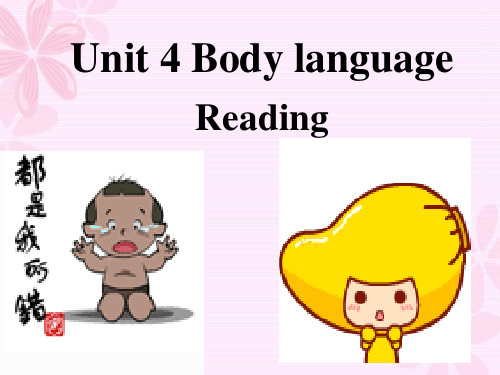
languages are bad. F
5.All members of a culture behave in the
same way.
F
TASK 3:Answer the following questions
1. Is the author of this passage male or female? How do you know ? 2.What were the two mistakes that the author noticed? 3.How can we understand “These actions are not good or bad”?
Fill in the blanks
Body language is used by people for sending messages to one another. In many countries in
the world, men k_is_s__ each other when they meet. In Britain, people usually s_h_a_k_e_ hands
think deeply
stomachache go this way
【课堂互动探究】
Look at the pictures. What are the following ways of communicating?
gesture
posture
facial expression eye contact
Para.1
ParSt.u2mmaDriizfefetrheentmsatuindeidnetas haaccvoerddiifnfegrteont (Parat.h2e-3m) eagnreinetginagndcuksetyomweorrsd. s.
新人教版高中英语必修四Unit4 Body Language Reading教学反思与心得体会
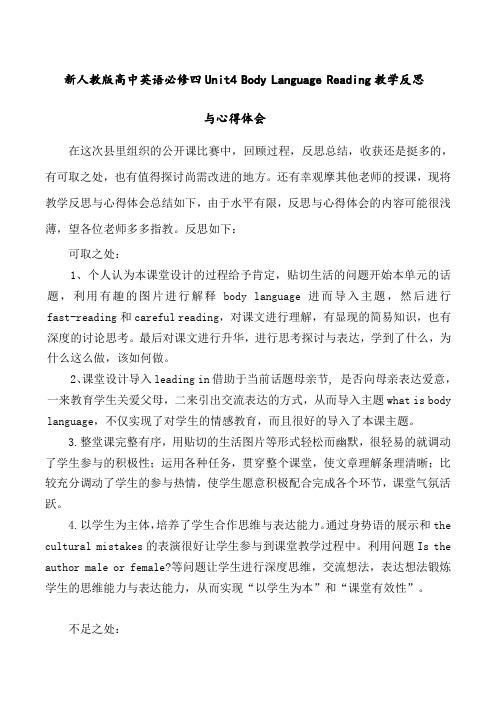
新人教版高中英语必修四Unit4 Body Language Reading教学反思与心得体会在这次县里组织的公开课比赛中,回顾过程,反思总结,收获还是挺多的,有可取之处,也有值得探讨尚需改进的地方。
还有幸观摩其他老师的授课,现将教学反思与心得体会总结如下,由于水平有限,反思与心得体会的内容可能很浅薄,望各位老师多多指教。
反思如下:可取之处:1、个人认为本课堂设计的过程给予肯定,贴切生活的问题开始本单元的话题,利用有趣的图片进行解释body language 进而导入主题,然后进行fast-reading和careful reading,对课文进行理解,有显现的简易知识,也有深度的讨论思考。
最后对课文进行升华,进行思考探讨与表达,学到了什么,为什么这么做,该如何做。
2、课堂设计导入leading in借助于当前话题母亲节, 是否向母亲表达爱意,一来教育学生关爱父母,二来引出交流表达的方式,从而导入主题what is body language,不仅实现了对学生的情感教育,而且很好的导入了本课主题。
3.整堂课完整有序,用贴切的生活图片等形式轻松而幽默,很轻易的就调动了学生参与的积极性;运用各种任务,贯穿整个课堂,使文章理解条理清晰;比较充分调动了学生的参与热情,使学生愿意积极配合完成各个环节,课堂气氛活跃。
4.以学生为主体,培养了学生合作思维与表达能力。
通过身势语的展示和the cultural mistakes的表演很好让学生参与到课堂教学过程中。
利用问题Is the author male or female?等问题让学生进行深度思维,交流想法,表达想法锻炼学生的思维能力与表达能力,从而实现“以学生为本”和“课堂有效性”。
不足之处:1. 学生思考的广度不够,阅读中停留在reading for information较多,而缺少reading for thinking,教学过程中基本上基于信息找寻的问题居多,而进行深入思考的的问题过少而且范围狭窄。
译林版高中英语选择性必修四Unit4 Reading 练习(雅礼版)

Unit 4 Never too old to learnReading II: Language PointsPart I: In-class exercises.1.Television is _______ effective means of communication.2.All the means _________________ (try) up to now.3.She is _______ no means an inexperienced teacher.4.She did not perceive ________ (she) as disabled.5.This discovery was perceived _____ a major breakthrough.6. I perceived _____ change in her behaviour last week.7.There is a general public __________ (perceive) that standards in schools are fall-ing.8.The kids found ______ hard to keep still.9.We stayed in a village ________ time has stood still.10.翻译:Still waters run deep.11.The course allows students ___________ (progress) at their own speed.12.The line of traffic ___________ (progress) slowly through the town in rush hours.13.The weather became colder as the day _________ (progress).14.Recently, the proposal ______________ (generate) a large amount of interest.15.The company, New England Electric, burns coal ___________ (generate) power.16.We should develop critical thinking skills by giving students opportunities ____________ (generate) ideas.17.These reasons are not sufficient ____________ (justify) the ban.18.My deskmate felt _____________ (sufficient) well to come to school the next day.19.His salary is ______________ (sufficient) to meet his needs.20.There's a ___________ (sufficient) of drama in these lives to sustain your interest.21.The government has taken a range of measures ___________ (boost) the local tourism.22.The cut in interest rates will give ____ further boost to/for the economy._______ did give me a boost to win such a big event.23.To get a higher mark than expected did __________ (boost) my confidence.Part II: Analysis of difficult sentences.Know that you will never know all there is to know and wonder at it.该句的主句为______________________,其中that引导一___________, 而该从句中又包含一定语从句________________来修饰_______,只不过该词后省略了关系代词____________。
Unit 4 Reading for Writing语言点(课件)高中英语人教版选择性必修第四册

14
5. Today, I want to relay to you that I'm proud of the work my mother has done, and I am now supportive of it.
今天我想告诉你们的是,我为我妈妈所做的工作感到骄傲,我现在也
我母亲还到农村巡 回治疗,帮助残疾人,为当地医生提供咨询和 培训。
n. 咨询;咨询会
consult vt.咨询;请教;查阅;商量 ✓concosunlstualnttsbn.. a顾b问ou;t/高on级s顾th问. 关医于师某,事会请诊教医/师咨;询咨某询人者 ✓ consult with sb about/on sth. 与某人协商某事 ✓ consult the dictionary 查字典 ✓ consult....for... 为······查阅(词典、参考书等)
is wet.
③ ____A__s____it was late, we came back soon. ④ We can't go out______b_e_c_a_u_s_e_____ it is too cold.
单句语法填空 Exercise
1. She__h_a_s_r_e_tu_r_n_e_d__(return) from India lately.
我们都想当然地认为他们已经完成了他们的任务。
3) Human beings __to_o__k_it__fo_r_g_r_a_n_t_e_d__ (以为它理所当然) that their brains held all the solutions, but maybe their hearts can be a better guide.(2019江苏高考)
新课标人教版必修四Book4 Unit4 Reading
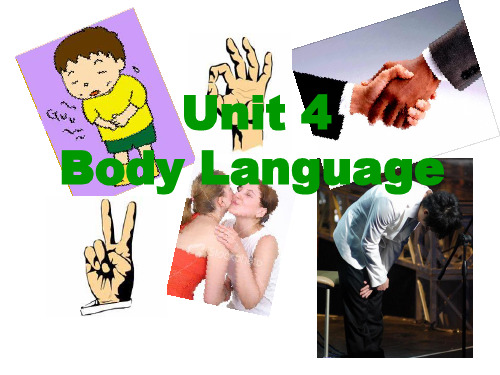
Ways to greet each other Approach others closely and are more likely to touch them. Shake hands, do not stand very close to others or touch strangers when they meet. Bow Shake hands. Shake hands and stand quite close to other men. Nod to women but do not shake hands with them.
我的课堂我做主
Assignment(任务分配)
Group1. → Question (3,4). Group2. → Question (5). Group3. → Question (1). Group4. → Question (2). Group5. → Question (6). Group6. → Question (7).
Japan: bow
Some western countries: hug
Russia, France, Arab: kiss
Reading
Communication:
No problem?
Learning aims
• 1、To learn some new words and phrases. • 2、To know different body languages represent different meanings. • 3、To respect other country’s body languages.
Why do we need to study body language?
必修四unit4 Reading communication:no problem 课件
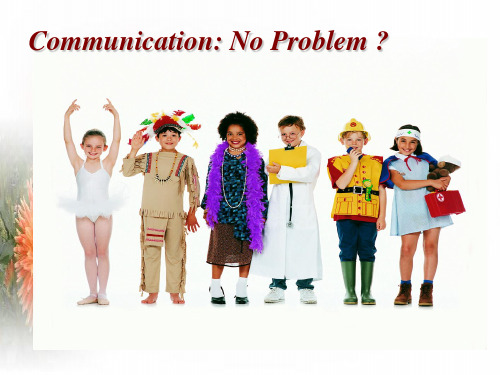
C. People use body movements to send messages and
different body movements have different meanings. D. The importance of knowing customs.
Communication: No problem?
1)not 与all, both, every, each 及含every 的合成词连用时, 无论not位于这些词的前面还是后面,都构成部分否定, 意为“并非所有的… …都… …” 表示全部否定,要用none, neither, no one, nothing或no 等来表示或借用never, not…at all来进行全部否定。
Expressions preview
1.defend against 保卫……以免 2.on the contrary 相反地 3.in the same way 以相同的方式 4.at ease
舒适;快活; 总的来说;通常
5.be likely to
6.in general
很可能……;有希望……
昨天我 represent 代表 ed马金中学去 迎接 greet 英国的一个 association 社团 到我们学校
communicate 交流 , 出于 curiosity 好奇 我们 approach 靠近 ed他们,但同时由于潜意识 ed自己,我们出现了 major 地 defend 保护 主要 misunderstanding truly 发生 的 误会 。 这是真实 的。
7. People from places like Spain, Italy or South American countries approach others closely and are more likely to touch them.
人教版选择性必修第四册Unit4 Reading and Thinking
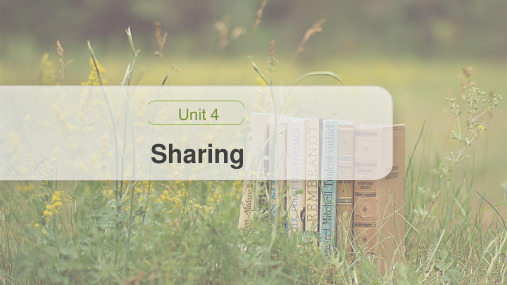
[名师点津] not to mention“更不用说”,相当于一个插入语,但其后所接 的词的形式要求与前面的词平行一致,一般用于否定句之后。表达“更不用 说”的短语还有:①let alone ②not to speak of。
Sometimes I wonder how relevant chemistry is to these students—few
(1)I’ve heard that,in the Sahara,there is no shade during the day,and the stars seem especially brilliant on clear nights. 我听说在撒哈拉,白天没有阴凉之处,在晴朗的夜晚星星看起来格外灿烂。 (2)Water is usually warmer in direct sunlight than in the shade . 水通常是在阳光直射的地方比在阴凉处温度高。 (3)Its long branches and leaves shade them from/against the sun. 它长长的树枝和树叶为他们遮挡了阳光。 (4)I saw that merchant sitting under the shade of a tree,reading a book. 我看见那个商人坐在树荫下读书。
Unit 4
Sharing
内容索引 Period Two Reading and Thinking—Language Points
1. parcel
2. jam 3. mail
4. clay 5. weed
基 础 自 测 自主学习 落实基础知识
n.包裹 vt.裹好;打包 n.果酱;堵塞 n.邮件;信件;邮政 vt.邮寄;发电邮给 n.黏土;陶土 n.杂草;野草 vt.& vi.除杂草
高中英语必修四unit4Reading

Unit 4 Reading Communication: No problem?
Brainstorming
1. What is the purpose of language? The purpose of language is to communicate with other people.
1. Englishmen often stand close to others or touch strangers as soon as they meet. F
2. Most people around the world F now greet each other by kissing.
George Cook (Canada)
Julia Smith (Britain)
Tony Garcia (Columbia)
First-reading
I. While reading, please try to divide the whole passage into several parts and find out the main idea. Part 1. (Para. 1) Meet the visitors at the airport.
Part 4. (Para. 5) Summary of body language.
II. How do different international students behave when they greet people? Complete the chart with information from the passage.
3. There are many different ways to greet someone using words. How many ways can you think of to greet someone if you cannot speak?
高一英语必修四_unit4__reading课件

Unit 4 Body language •What do you think the purpose of language?•How can you communicate with someone if you cannot speak?•How many ways can you think of to greet someone if you cannot speak?Communication: No problem?•Step1. fast reading•1) What is the main idea of the text?2) How many parts can we divide the passageinto?3) What’s the main idea for each part?•1) What is the main idea of the text?–The passage introduces some examples of cultural body language when greetingpeople.•2) How many parts can we divide the •passage into?–Part 1 (para. 1)–Part 2 (para. 2 and 3 )–Part 3 (para. 4 and 5 )3) What’s the main idea for each part?Part 1 (para. 1)We are sent to Capital International Airport to meet some international students.Part 2 (para. 2 and 3)Examples of learned or cultural “bodylanguage”.Part 3 (para. 4 and 5)Different people have different physical ways to greet others. Learning about their customs can help avoid difficulties in communication.Step 2. Scan the text and find outCountry / Area Ways to greet each otherBritain Shake hands. Do not stand very close to others or touchstrangers when they meet.Canada Shake hands.Japan Bow.Spain, Italy, SouthAmerican countriesApproach others closely and are more likely to touch them. France Shake hands and kiss each other twice on each cheek.Middle East, some Muslim countries Shake hands and stand quite close to other men. Nod to women but do not shake hands with them.Name Description Body language To whom Tony Garcia man from Colombia Kiss on the cheek everyoneJulia Smith woman from Britain no touching everyoneAkira Nagata man from Japan bowing everyone George Cook man from Canada shaking hands everyoneAhmed Aziz man from Jordan shaking handsnodding to manto womanDarlene Coulon woman from France shake hands and kisstwice on each cheekpeople she knowsStep 3. use the passage to help you answer the following questions1) Is the author of this passage male or female? How doyou know?The author is male. Ahmed Aziz will not shake hands with women, but he shakes hands with the author.2) What were the two mistakes that the author noticed?He noticed that the Colombian man kissed theBritish woman, but in her culture, a kiss from astranger is not expected. He also noticed that theJapanese man bowed just as the Canadian manstarted to shake hands, so one man’s nosetouched the other man’s hand.•3)Who seemed to prefer to keep more physical diastance from others? Who seemed to prefer closer physical distance ?•The British woman, Julia and probably the Canadian man, George, seemed to prefer to keep more physicaldistance from others. The Colombian man, Tony, and the Jordanian man Ahmed, seemed to prefer closer physical distance.•4) Did any students have similar greeting customs? If so, which one?•Yes. Tony from Colombia and Darlene from France had a similar greeting custom —a kiss. George from Canada and Ahmed from Jordan also had a similar greeting custom —a handshake, but Ahmed shakes hands only with men.•5) “When in Rome, do as the Romans do.”What do you think this famous saying means?•This saying means that when we are in a certain place, we should follow the customs of the people who live in that place, not our own customs.•6) Do you agree with the author’s statement that body language is not good or bad? Why or why not?Step 4. summaryStep 5. translation1.The first person to arrive was TonyGarcia, closely followed by Julia Smith from Britain.2. Not all cultures greet each other thesame way, nor are they comfortable in the same way with touching or distance between people.3. However, people from places like Spain,Italy or South American countriesapproach others closely and are morelikely to touch them.Step 5. homework •Complete p.27 Exercise 3。
公开课教案】外研版高一英语必修四unit4 reading 教案
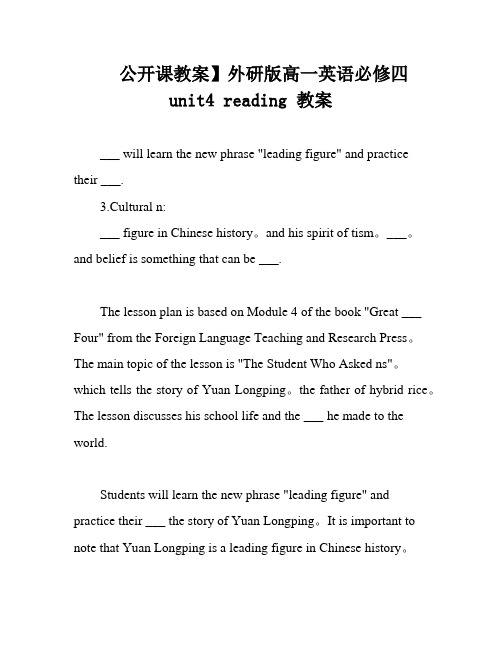
公开课教案】外研版高一英语必修四unit4 reading 教案___ will learn the new phrase "leading figure" and practice their ___.3.Cultural n:___ figure in Chinese history。
and his spirit of tism。
___。
and belief is something that can be ___.The lesson plan is based on Module 4 of the book "Great ___ Four" from the Foreign Language Teaching and Research Press。
The main topic of the lesson is "The Student Who Asked ns"。
which tells the story of Yuan Longping。
the father of hybrid rice。
The lesson discusses his school life and the ___ he made to the world.Students will learn the new phrase "leading figure" and practice their ___ the story of Yuan Longping。
It is important to note that Yuan Longping is a leading figure in Chinese history。
and his spirit of tism。
___。
and belief is something that can be___.___ students about the life and achievements of Yuan Longping。
英语精品 新教材选择性必修四UNIT 4 Reading and Thinking

UNIT 4SHARING主题语境——人与社会之社会服务与人际沟通——人际关系【语境概说】本单元的主题语境为人与社会之社会服务与人际沟通——人际关系,该主题语境主要为良好的人际关系与社会交往;社会公益事业与志愿服务;跨文化沟通、包容与合作等。
该主题与学生学习和生活密切相关,这有助于培养学生良好的人际关系,增强社会公德意识,促进学生的沟通能力、包容与合作优良品质,使之成为对社会有益的全面发展的人才。
Section ⅠReading and Thinking(1)1.Discussing—Look at the following pictures and answer the questions.What events are these pictures related to?The__answer__is__open.2.Predicting—Look at the pictures and the title on Page 38 and predict what the text is probably about.The__text__is__probably__about__volunteering__in__the__Bush.1.First reading—Read the passage carefully and do the following exercises.(1)Match the main idea with each paragraph.Para.1 A.What the author witnessed in Tombe’s villageParas.2~3 B.Receive a parcel from homeParas.4~7 C.The author’s feeling after visiting the villagePara.8 D.The conditions about the bush school and the students答案Para.1 B Paras.2~3 D Paras.4~7 A Para.8 C(2)Read for details.①What has been Jo’s most challenging subject to teach? Why?Science__is__Jo’s__most__challenging__subject.Because__the__students__have_no __concept__of__doing__experiments.②What did Jo notice after the meal?He__noticed__a__can__standing__upside__down__on__the__grill__over__the__fire .After__a__while,Tombe__threw__it__out__of__the__doorway.2.Second reading—Fill in the blanks according to the passage.3.Third readingSummarizing:Read the text again and try to summarize the main idea in one sentence. The__author__told__us__about__his__experience__when__he__worked__as__a__v olunteer__in__a__remote__place.1.Group work:If you are a journalist of your school English newspaper,please make an interview with some students about voluntary work according to the text.You may start like this.A:Hello,I’m a journalist of our school English newspaper.What do you think of acting as a volunteer in a poor and remote area?B:...2.Would you like to become a volunteer teacher? Why or why not?The__answer__is__open.阅读技巧点拨如何阅读课文内容?1.Adjust the speed of reading to have a good understanding of the text.2.If the material is easy to understand,one should read it quickly.3.If the material is difficult,one can read it slowly and carefully.4.Refer to the dictionary if necessary.语言现象感知Ⅰ.单词理解体会句中加黑单词的词性和含义1.The parcel came in this morning’s post.n.包裹2.Please come for your mail whenever it’s convenient.n.邮件3.The water in the pan was beginning to bubble.v i.沸腾4.A cloud of dust rose as the truck drove off.n.灰尘5.I find it really hard to drag myself out and exercise regularly.v t.强迫Ⅱ.词块积累写出下列词块的含义1.a bit damaged有点儿损坏2.be dying to do sth渴望做某事3.a dusty track一条尘土飞扬的小道4.be greeted by被……迎接;受……欢迎5.not to mention更不用说6.adapt to these conditions适应这些条件7.have no concept of没有……概念8.the other day不久前某一天9.to be honest说实话10.stick out of the roof露出屋顶11.throw out of抛出12.participate in their conversation参与他们的谈话Ⅲ.句式欣赏1.It takes/took sb some time to do sth花费某人时间做某事It takes me only a few minutes to walk to school down a dusty track covered in weeds.2.see+宾语+动词-ing形式(作宾补)When we arrived at the village,Tombe’s mother,Kiak,saw us coming and started crying “ieee ieee”.3.even though虽然;即使I loved listening to the family talking softly to each other in their language,even though I could not participate much in the conversation.Ⅰ.阅读理解ABig Brothers Big Sisters is based on the simplicity and power of friendship.It is a program which provides friendship and fun by matching vulnerable__young__people (ages 7-17) with a volunteer adult who can be both a role model and a supportive friend.V olunteer tutors come from all walks of life—married,single,with or without children.Big Brothers and Big Sisters are not replacement parents or social workers.They are tutors:someone to trust,to have fun with,to talk and go to when needed.A Big Sister and Little Sister will generally spend between one and four hours together three or four times each month for at least twelve months.They enjoy simple activities such as a picnic at a park,cooking,playing sport or going to a football match.These activities improve the friendship and help the young person develop positive self-respect,confidence and life direction.Big Brothers Big Sisters organizations exist throughout the world.It is the largest and most well-known provider of tutor services internationally and has been operating for 25 years.Emily and Sarah have been matched since March 2008.Emily is a 10-year-old girl who has experienced some difficulties being accepted by her schoolmates at school.“I was pretty sure there was something wrong with me.”Emily’s mum came across Big Brothers Big Sisters and thought it would be of benefit to Emily by “providing different feedback(反馈) about herself other than just relyingon schoolmates to measure her self-worth.”Sarah wanted to get involved in a volunteer program.“I goggled it and found out how to be a part of it.I thought it would be fun for me to get involved in making time to do something because sometimes it’s all work and no play.”Big Brothers Big Sisters has been of great benefit and enjoyment to both Emily and Sarah.They love and look forward to their time together and the partnership has certainly helped Emily be more comfortable in being the wonderful,happy and unique girl she is!【语篇解读】大哥哥大姐姐是一个通过招募志愿者为脆弱的青少年提供指导和友情的活动。
- 1、下载文档前请自行甄别文档内容的完整性,平台不提供额外的编辑、内容补充、找答案等附加服务。
- 2、"仅部分预览"的文档,不可在线预览部分如存在完整性等问题,可反馈申请退款(可完整预览的文档不适用该条件!)。
- 3、如文档侵犯您的权益,请联系客服反馈,我们会尽快为您处理(人工客服工作时间:9:00-18:30)。
Find out the two mistakes.
He approaches Ms Mr. Garcia Smith by touching ____ _______ her from The shoulder kissed (Columbia) _________ and ______ first her on the ________. cheek mistake Julia Smith She stepped ______ _______ back from surprised appearing _________ (Britain) and take a few steps away from _______ ______ Mr. Garcia.
Russia, France, Arab: kiss
Reading
COMMUNICATION: NO PROBLEM?
Fast Reading The main idea of the whole text:
It tells us about the importance and necessity
canada shake hands
Jordan
Shake hands and stand quite close to other men. Nod to women but do not shake hands with thems
France
shake hands and kiss twice on each cheek
people she knows
What do people in different countries usually do when meeting?
countries
Ways to greet each other
Columbia approach others closely and are more likely to touch them. Japan bow
of
and its differences between different cultures.
body language
Listen to the tape and match the main idea of each part with lines. Part 1. Different people have different (Para.1) body language. Part 2. (Para. 2~3) Part 3. (Para. 4) Part 4. (Para. 5) Summary of body language. Meet the visitors at the airport. People from different countries express greetings in different ways.
True or false?
1. Mr. Garcia kissed Miss Julia Smith because they have known each other well. F 2. George Cook reaches his hand out in order to shake hands with the Japanese. T 3. All cultures don’t greet each the same way. T
Divide the passage into several parts and find out the main idea.
Part 1: You are sent to CIA to meet this (Para 1) year’s international students. Part 2 Examples of learned or cultural (Para2-3) “body language”. Part 3: Different people has different (Para 4) body language. Part 4: Summary of body language. (Para 5)
2. Where is Tony Garcia from? C A. Britain. B. Japan. C. Colombia. D. Canada. 3. From Paragraph 2 we know that A Japanese prefer to ____ when they are introduced to others. A. bow B. shake hands C. kiss each other D. touch others’ shoulders
language because it helps us to get better understanding among people from different cultures. T
Choose the best answer.
1. What did the writer go to the Capital International Airport for yesterday? B A. To see off his friend. B. To meet international students. C. To buy a flight ticket. D. To meet some visitors coming from several countries.
a Japanese The second mistake
George Cook from (Canada)
He ________ to Mr. bowed Cook and his nose touched _________ Mr. moving Cook’s _______ hand _______. He ________ reached his hand ______ ______ out _______ to the Japanese.
6. Men from all Muslin countries will
not shake hands with women. F
7. From the passage we can see
western cultures are better than
eastern cultures. F
8. It’s necessary to study body
man from Jordan shaking hands
To Whom
everyone
shaking hands nodding shake hands Darlene woman and kiss Coulon from France twice on each cheek
to men to women
Unit 4 Body language
Reading
What is body language?
◆Body language is actions. ◆Body language is used to express yourself,
and communicate ideas.
◆Body language goes with no words. ◆ Body language is actions that can communicate ideas without use of words.
Definition of Body Language
One form of communication without using any words.
gesture
posture
eye contact
facial expression
What are the following facial expressions?
smile
cry
happy
surprise
angry
fear
What do people in different countries usually do when meeting?
China, BritaiБайду номын сангаас: handshake
Japan: bow
Some western countries: hug
Tony Garcia
Julia Smith
everyone
no touching bowing
everyone
Akira man from Nagata Japan
everyone
Name
George Cook Ahmed Aziz
Description Body Language
man from Canada
Answer the questions.
1. Why are the international students coming to China?
They are coming to China to study at Beijing University.
2. Why is Julia Smith surprised? Julia Smith is surprised that Mr Garcia touches her shoulder and kisses on the cheek when they meet. 3. Why did the author move back from Ahmed Aziz? The author moved back because he comes too close to talk to the author.
George Cook (Canada)
a Japanese
